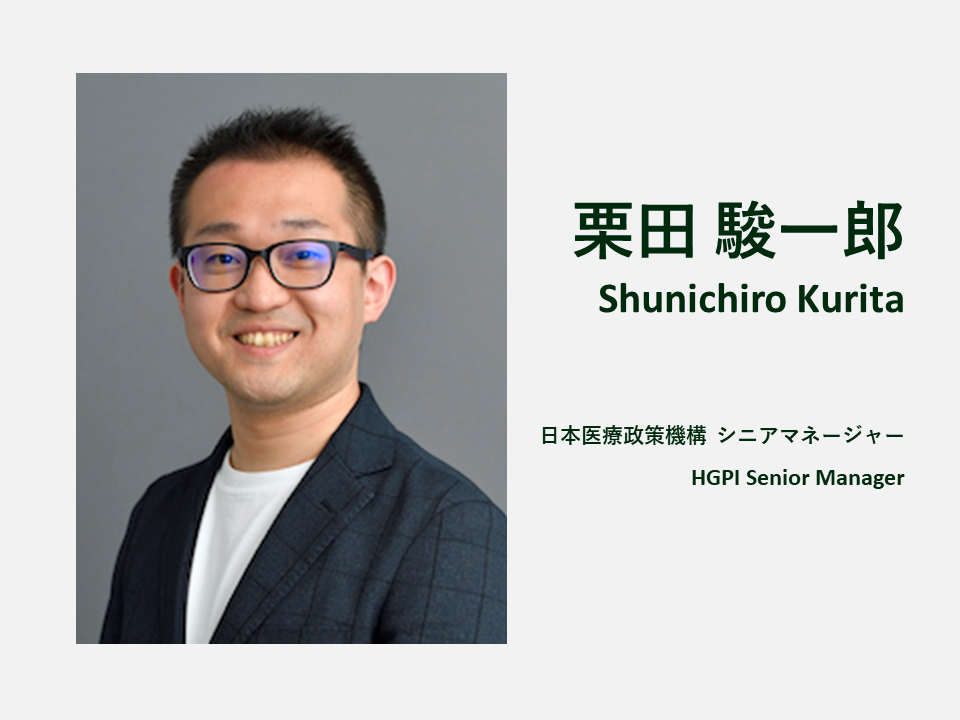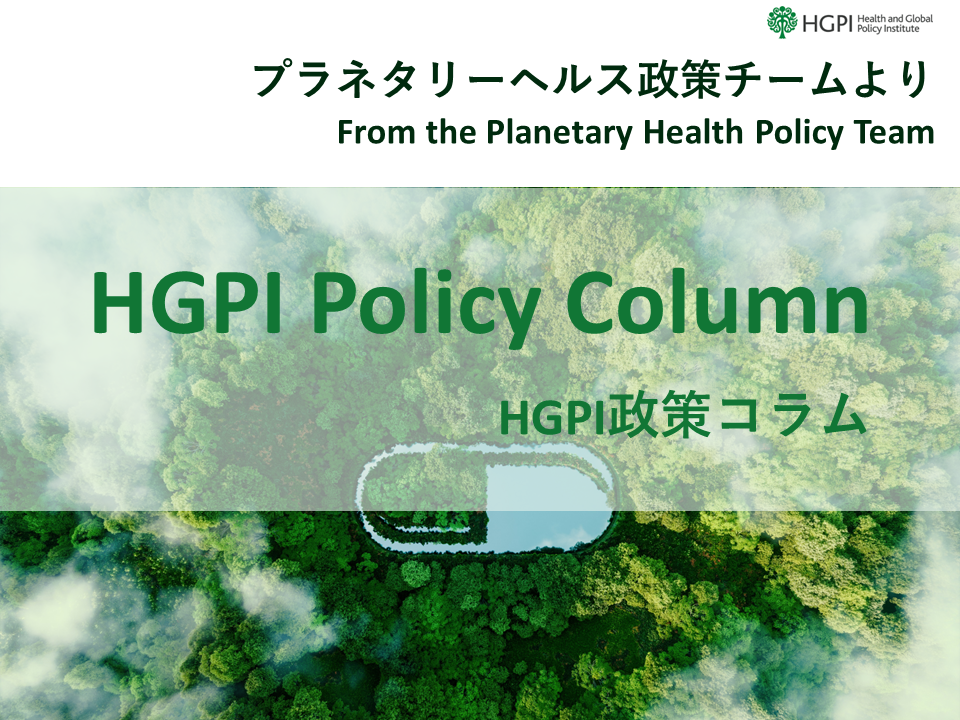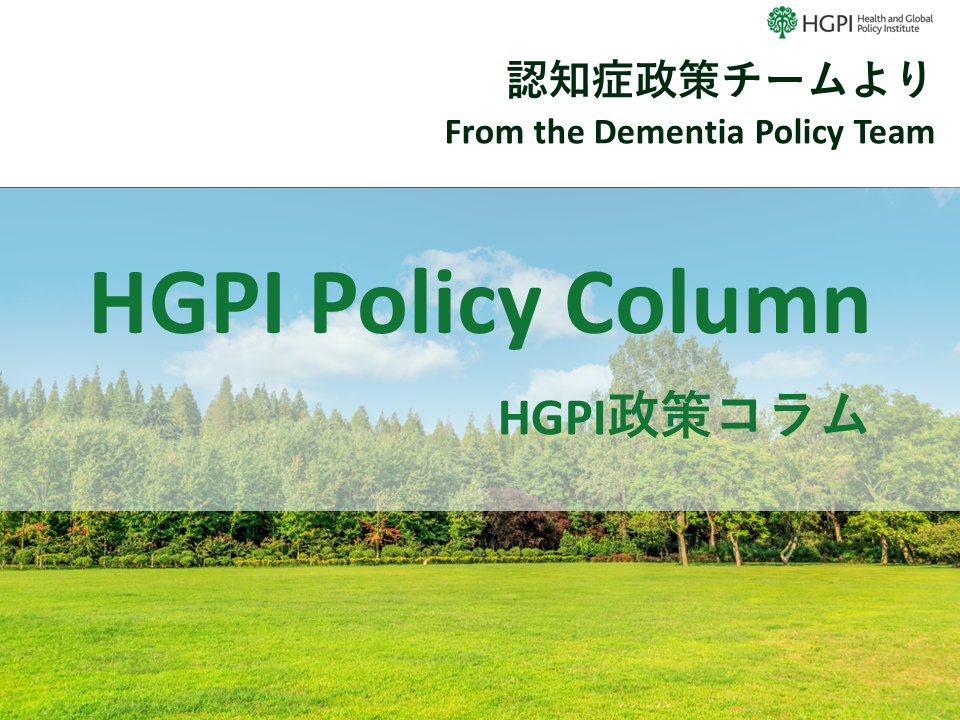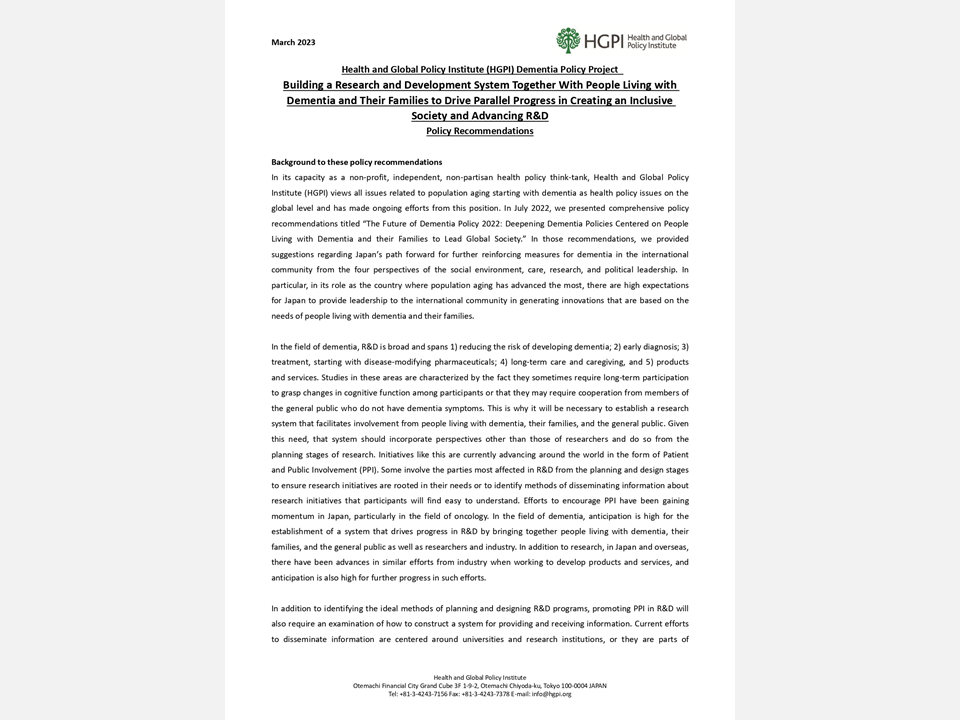[HGPI Policy Column] No. 38 – From the Dementia Policy Team – Thoughts on the “Council for the Realization of a Happy Aging Society That Faces Dementia”
date : 10/18/2023
Tags: Dementia, HGPI Policy Column
![[HGPI Policy Column] No. 38 – From the Dementia Policy Team – Thoughts on the “Council for the Realization of a Happy Aging Society That Faces Dementia”](https://hgpi.org/en/wp-content/uploads/sites/2/column-39-top_JPNENG.png)
What is the Council for the Realization of a Happy Aging Society That Faces Dementia?
On September 27, 2023, the inaugural meeting of the Council for the Realization of a Happy Aging Society That Faces Dementia was held at the Prime Minister’s Office. It was the Government’s first official meeting on dementia since the enactment of the Dementia Basic Act for an Inclusive Society (hereinafter, the “Dementia Basic Act”) on June 14, 2023. I must also note that the Dementia Basic Act has yet to come into effect as of the time of writing in October 2023, and that the Council was not something that was established in accordance with that Act.
There are high expectations for the enactment of the Dementia Basic Act on June 14, 2023 to become a major turning point in dementia policy. With “promoting an inclusive society” named as one of its key objectives in Article 1, it is an important law that clearly states the rights of people living with dementia and that prioritizes involvement from people living with dementia and their families in community-building, research and development, and policy creation. After it was approved, the Dementia Basic Act and various issues surrounding dementia were covered in many media outlets, which has led to heightened interest throughout society. The Government of Japan did not let this opportunity slip away and Prime Minister Fumio Kishida offered remarks on the subject during a press conference held at the end of the Diet session on June 21, one week after the Dementia Basic Act was enacted. There, he said, “Dementia is a topic of great concern to all citizens, and is a particularly serious issue for senior citizens and their family members. I view it as a vital issue that must be addressed without delay through efforts that span the entire Government and the entire nation. Based on the Dementia Basic Act enacted this month, we will approach this as a new national project for Japan.” While it is common for references to be made to new laws and main discussion points from the previous Diet session at press conferences held after the Diet adjourns, I believe the words “national project” gave an extremely strong impression.
During a visit to a long-term care facility in Gunma prefecture, Prime Minister Kishida offered further comments at a press conference on August 3, 2023. There, he mentioned the establishment of a Council led by the Government before the Dementia Basic Act comes into effect, saying, “Regarding the response to dementia, the Dementia Basic Act was enacted during the ordinary session of the Diet that closed recently, I will establish a Council next month, before that Act comes into effect. I will preside over the Council and it will include people living with dementia and their families, experts, and other related parties. In addition to research and development for prevention, early diagnosis, and progression control, I would like for the Council to deepen discussions on advancing comprehensive measures for dementia including those for building public awareness, amplifying messages from people living with dementia, establishing community-based healthcare and welfare systems, and providing support for the family members of people living with dementia, including for work-life balance.”
Given this backdrop, the first meeting of the Council was held on September 27, 2023. In addition to the Prime Minister and other relevant ministers, representatives of patient advocate organizations, academics from the field of medicine, and long-term care providers also took part in the meeting as specialists. When describing the objective of the Council, its reference materials point out that discussions are being held before the Dementia Basic Act comes into effect, saying “To closely listen to and reflect the voices of those most affected in policies to create the inclusive society described by the Dementia Basic Act (which is a vibrant society where all people including those with dementia can coexist while providing mutual support and respecting each individual’s personality and individuality), the Council for the Realization of a Happy Aging Society That Faces Dementia (hereinafter, “the Council”) will convene before the Dementia Basic Act comes into effect and will have participation from people living with dementia and their families as well as from specialists” (from the Prime Minister’s Office of Japan website, “Council for the Realization of a Happy Aging Society That Faces Dementia, First Meeting Agenda, Attachment 1-1). The aforementioned reference materials also named another objective, saying, “To realize a happy society in which people can age with peace of mind, Council meetings will examine measures for various issues related to daily life for older adults, including personal guarantors for elderly people without relatives.” The background of this objective is unclear, and as someone who has closely followed discussions on the Dementia Basic Act, its inclusion was somewhat sudden and unexpected.
A sense of discomfort toward Prime Minister Kishida’s remarks and the significance of words in politics
Prime Minister Kishida gave the concluding remarks at the Council’s first meeting, and the full text of those remarks was posted on the official website of the Prime Minister’s Office of Japan that same day. (At time of writing, an official English version of these remarks has yet to be published.) Prime Minister Kishida began his remarks by saying, “I would like to fully reflect opinions shared by everyone here in future policies.” He then addressed three points: (1) the regulatory approval of the pharmaceutical Lecanemab and future system development; (2) boosting Japan’s competitiveness on the international stage through therapeutic drug development; and (3) addressing the issue of personal guarantors for people without relatives.
There is no doubt that all three of these points are important policy issues. From the perspective of sustainability for both the healthcare provision system and the public health insurance system, the new drug Lecanemab is attracting a great deal of attention. In terms of reinforcing domestic innovation and economic security, the idea that Japan should lead the way in developing the next therapeutic drug is also a vital topic. Finally, from the perspective of ensuring stable living in Japanese society, where the number of elderly people living alone is on the rise, the issue of ensuring personal guarantors is something we will have no choice but to address.
However, the most important theme of the Dementia Basic Act is “an inclusive society,” and these words did not appear in Prime Minister Kishida’s remarks even once. Although the Council for the Realization of a Happy Aging Society That Faces Dementia was not established under the Dementia Basic Act, as long as its objectives include “before the Dementia Basic Act comes into effect,” I think it would have been best to make some reference to this theme.
As such, I would like to offer my own analysis as to why this occurred. Words carry great significance in politics. There is no shortage of examples in which remarks made in the Diet or during election campaign speeches ended up becoming major topics of conversation, with both good and bad results.
According to political scientist Vivien A. Schmidt, “discourse” takes two forms in the policy-making process: coordinative discourse and communicative discourse. Coordinative discourse encompasses “the common language and framework through which key policy groups come to agreement in the construction of a policy program,” and communicative discourse “serves as the means through which key policy actors seek to persuade the general public that the policies developed at the coordinative phase are necessary and appropriate” (Schmidt, 2002). Within dementia policy, I believe it is safe to say that the “inclusive society” theme is a representative example of coordinative discourse. For the recently-enacted Dementia Basic Act, many related parties came together through this phrase and its concepts, which helped build consensus. On the other hand, I believe the term “communicative discourse” applies to Prime Minister Kishida’s recent remarks. After all, the Council was not something that the Government was legally obligated to establish; it was something that was convened voluntarily by the Prime Minister and other surrounding parties when they realized it was necessary. Its purpose was to express to the public that the Government views dementia to be a key policy issue based on the recently-enacted Dementia Basic Act and that it will advance policies for dementia. In other words, I believe the Council has elements of ceremony to it.
Viewing the Council in this manner, I can think of two reasons for Prime Minister Kishida’s remarks. First, I believe the discussions held at the Council are part of economic measures that are to be compiled by the end of October 2023, so there was a strong awareness toward links to economic policies like new pharmaceuticals and reinforcing domestic innovation. This is only natural, as the nature of the modern welfare state means economic growth is essential for maintaining the social security system. Another reason may be that the “inclusive society” theme is not yet viewed as very persuasive in terms of communicative discourse. If Prime Minister Kishida and those around him had perceived the “inclusive society” theme as something that is convincing and that can be clearly explained to the public, I think it is likely Prime Minister Kishida would have utilized it to the greatest extent possible at the recent Council meeting. However, considering the need to provide explanations to the public, this concept is not yet broadly understood throughout society. In other words, the Prime Minister determined that the term “inclusive society” has yet to become something members of the general public can relate to and accept, and I think this is why the term did not appear in his remarks.
Conclusion
The thoughts shared in this column are only my personal opinions. Keeping that in mind, I would like to examine what actions those of us involved in dementia policy should take in the future. First, the concept of an “inclusive society” as it is described by the Dementia Basic Act must be disseminated more broadly. Normally, discussions are limited to the community of people who are interested in dementia, which includes us. However, when approaching broader society after the enactment of the Dementia Basic Act, it will be important to identify how to get involvement from members of the general public who are not interested in dementia. Achieving this will require those of us who are members of the dementia community to take action and communicate the concept of an inclusive society in a sincere manner so other people can understand it.
Another issue is identifying how to best involve people living with dementia and those close to them in the Council. After the Council met, certain participants pointed out that not enough time had been set aside for statements from those most affected. However, the first meeting was held at the Prime Minister’s Office and with the Prime Minister in attendance. It is common for the Cabinet Secretariat to hold such meetings as part of its efforts to coordinate all parties and make adjustments according to the policies of each ministry. As previously mentioned, this means time is limited at such meetings and they tend to be ceremonial in nature. Instead of deepening discussions, such meetings tend to emphasize sending a message to the public and to society. Not only does the national Government hold meetings like this; they are sometimes held by local governments, too. In the future, after considering how people living with dementia and their families can participate in policy-making processes at the national Government and local governments, it will be necessary to provide detailed explanations of the true purpose of such councils, their position in the overall administration, and other items for which administrative officials and related parties possess a tacit understanding. Furthermore, people living with dementia and other affected parties who participate in such councils must understand the true purpose of such councils, develop strategies for council meetings, and make full use of the opportunities that councils provide.
Writing as someone who is involved in dementia, in terms of public policy-related items like the policy process and social policy, the recent Council meeting was a very interesting event. I only hope its future meetings are more significant.
Column author
Shunichiro Kurita (Senior Manager, HGPI)
Top Research & Recommendations Posts
- [Policy Recommendations] The Path to a Sustainable Healthcare System: Three Key Objectives for Public Deliberation (January 22, 2026)
- [Research Report] The 2025 Public Opinion Survey on Healthcare in Japan (March 17, 2025)
- [Research Report] Perceptions, Knowledge, Actions and Perspectives of Healthcare Organizations in Japan in Relation to Climate Change and Health: A Cross-Sectional Study (November 13, 2025)
- [Research Report] The 2023 Public Opinion Survey on Satisfaction in Healthcare in Japan and Healthcare Applications of Generative AI (January 11, 2024)
- [Policy Recommendations] Reshaping Japan’s Immunization Policy for Life Course Coverage and Vaccine Equity: Challenges and Prospects for an Era of Prevention and Health Promotion (April 25, 2025)
- [Policy Recommendations] Developing a National Health and Climate Strategy for Japan (June 26, 2024)
- [Policy Recommendations] Achieving Equity in Multidisciplinary Pain Treatment and Support Systems for Pain Management (March 31, 2023)
- [Research Report] Survey of Japanese Physicians Regarding Climate Change and Health (December 3, 2023)
- [Public Comment Submission] “Assessment Report on Climate Change Impacts in Japan (Draft Overview)” (December 24, 2025)
- [Research Report] The Public Opinion Survey on Child-Rearing in Modern Japan (Final Report) (March 4, 2022)
Featured Posts
-
2026-01-09
[Registration Open] (Hybrid Format) Dementia Project FY2025 Initiative Concluding Symposium “The Future of Dementia Policy Surrounding Families and Others Who Care for People with Dementia” (March 9, 2026)
![[Registration Open] (Hybrid Format) Dementia Project FY2025 Initiative Concluding Symposium “The Future of Dementia Policy Surrounding Families and Others Who Care for People with Dementia” (March 9, 2026)](https://hgpi.org/en/wp-content/uploads/sites/2/dementia-20260309-top.png)
-
2026-02-05
[Registration Open] (Webinar) The 141st HGPI Seminar “Current Status and Future Prospects of Korea’s Obesity Policy: Voices of People with Lived Experience in Policy Promotion” (March 3, 2026)
![[Registration Open] (Webinar) The 141st HGPI Seminar “Current Status and Future Prospects of Korea’s Obesity Policy: Voices of People with Lived Experience in Policy Promotion” (March 3, 2026)](https://hgpi.org/en/wp-content/uploads/sites/2/hs141-top-1.png)
-
2026-02-06
[Research Report] AMR Policy Update #5: Cancer Care and AMR (Part 2)
![[Research Report] AMR Policy Update #5: Cancer Care and AMR (Part 2)](https://hgpi.org/en/wp-content/uploads/sites/2/HGPI_20260204_AMR-Policy-Update-5.png)








